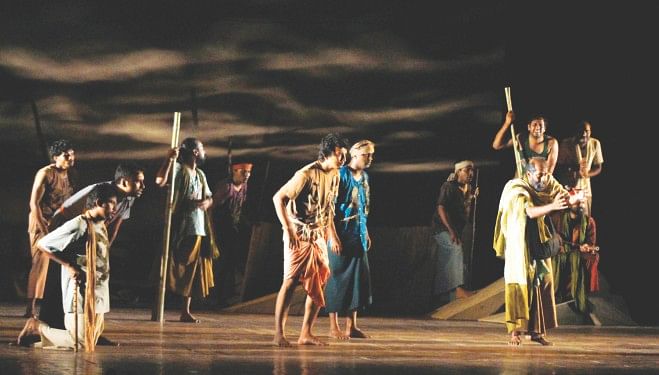“Badh”: The struggle of life
“Badh”: The struggle of life
Bangladesh Shilpakala Academy premiere new play

As part of Bangladesh Shilpakala Academy's (BSA) annual drive to produce new plays countrywide, the Theatre and Drama Department of the Dhaka unit of BSA premiered their production “Badh” at the National Theatre Hall on Friday. This year's theme for the campaign is literature-based plays, and “Badh” has been adapted from eminent writer Shawkat Osman's short story “Oi Badh'e”.
A brief inauguration programme was held prior to the staging, where Yeafesh Osman, State Minister for Science and Information Technology and also Shawkat Osman's son, attended as chief guest. Ramendu Majumdar, President of World ITI, was special guest while Liaquat Ali Lucky, Director General, BSA presided over the programme. Also speaking there, director of the play Mohammad Bari explained his inspiration behind choosing this story, stating that he had read it as a teenager and it moved him greatly. Yeafesh Osman, in his address said he often wondered whether his father was a writer or a politician, because in all his writings he had a conscious effort to strike the society with his thoughts.
“Badh” is set in Niamatnagar, and is the story of two factions of the village, Uttarpara and Dakkhinpara, who have had conflicts between them for generations. A sudden tidal surge washes the village away and the villagers seek refuge on the embankment dam. As tensions keep rising between the villagers of the two sides, Salim Matbor, the elderly sage, tries to maintain peace. As the southern side of the embankment begins to give in, the residents of Dakkhinpara seek shelter at the northern end and Salim Matbor takes them in, but the conflicts continue to rise. Meanwhile Fazal, one of the youth leaders of Uttarpara, has a new take on life following his wife's death, drowned in the tidal surge, and tries to convince his fellow villagers that life is bigger than such trivial conflicts and hatred. The tide continues to rise and threaten to wash away the embankment, but the villagers then see a big number of ants clinging to each other, forming a ball and riding the waves for survival, and it teaches them the valuable lesson of unity in the face of danger.
The stage space was left rather empty, with the backdrop set nicely with clever use of lighting; the ambient sounds and the very rustic, rural music arrangements also enhanced the ambiance greatly. In terms of acting, the play fared very well; it was difficult to find a single weak link in the cast. Toufiqul Islam Imon as Salim Matbor, AK Azad Setu as Fazal, Ehsanur Rahman as Abbas, Kanta Zaman as Moyna and Shafiqul Islam as Mannu all kept the audience in their grip with natural, strong deliveries and body language. The direction, albeit a little 'loose' in places, had quite a few moments of brilliance. The dialogues were free-flowing and uninhibited, the humour was crude (which is appropriate for the rural setting) but the comic relief were aptly placed, while the transition of scenes that included two well-done flashbacks and a beautiful romantic sequence, were all worthy of praise. A brief injection of an unscrupulous government official and local administration (chairman) in the play also added a dimension.
The costumes, choreography and props were also designed and executed neatly, making it all in all a fairly successful production.
BSA Director General Liaquat Ali Lucky informed that the other Shilpakala Academy units are producing their dramas on literary works, and a festival of those plays will be held next month in Dhaka.